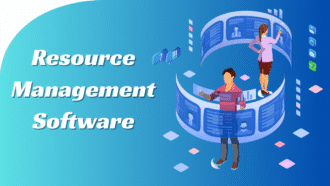CRM Software and ERP Systems: Detailed Comparison
- 1 What is ERP, and What are Its Benefits?
- 1.1 Efficiency:
- 1.2 Collaboration:
- 1.3 Scalability:
- 1.4 Cost Savings:
- 2 What is a CRM, and What are Its Benefits?
- 2.1 Improved Customer Service:
- 2.2 Sales Efficiency:
- 2.3 Marketing Optimization:
- 2.4 Improved Analytics:
- 2.5 What is each of Them Used for?
- 3 What is the Difference between ERP and CRM?
As a business owner or manager, you may have come across the terms ERP and CRM. These are technology tools that can significantly boost your business’s efficiency and profitability. But what exactly are these systems, and how can you determine which one is right for your business?
What is ERP, and What are Its Benefits?

ERP stands for Enterprise Resource Planning. It’s an integrated management solution that helps businesses manage and integrate essential parts of their businesses, such as purchasing, planning, sales, marketing, finance, and human resources.
ERP systems bring numerous benefits to businesses, including:
Efficiency:
ERP eliminates redundant processes and systems, thus reducing the need for manual entry and enhancing data accuracy.
Collaboration:
It breaks down walls between departments, provides a bird’s-eye view of various operations, and enhances interdepartmental collaboration.
Scalability:
ERP systems can be easily upgraded to accommodate new processes and additional users as a business grows.
Cost Savings:
By streamlining processes, ERPs can result in considerable cost savings in the long run.
What is a CRM, and What are Its Benefits?

CRM stands for customer relationship management. A CRM tool, or CRM software, is a system designed to manage a company’s interactions with its current and potential customers. It involves managing contacts, sales, productivity, and more.
The benefits of a CRM system include:
Improved Customer Service:
CRMs store customer interaction histories, enabling businesses to provide personalized customer experiences.
Sales Efficiency:
CRMs streamline the sales process, resulting in faster sales cycles and increased revenue.
Marketing Optimization:
CRMs enable businesses to understand their customers better and design targeted marketing campaigns.
Improved Analytics:
CRMs offer robust reporting and data analysis capabilities that can inform decision-making.
What is each of Them Used for?
ERP and CRM are used in diverse processes and industries, often complementing each other.
ERP is widely used in the manufacturing, retail, financial services, and healthcare sectors, among others. It manages procurement, inventory, demand forecasting, financial management, and human resources.
CRM tools, on the other hand, are extensively used in sales, marketing, customer service, and industries such as real estate, technology, consulting, and healthcare. It manages leads, sales pipelines, customer service tickets, and marketing campaigns.
What is the Difference between ERP and CRM?
The first difference lies in their primary focus. ERP systems are business-focused, aiming to ensure the smooth and efficient management of business operations, from inventory and supply chains to finance and human resources. On the other hand, CRM systems are customer-focused and designed to manage customer interactions, drive sales, and improve customer service.
Data Management:
ERP and CRM systems also differ in the types of data they manage. An ERP system manages internal and operational data across various departments. This includes everything from materials and inventory data to financial and HR information. Conversely, a CRM system manages external, customer-related data, such as contact information, sales history, and customer interactions.
Integration:
Both systems integrate with other business tools, but in distinct ways. ERP systems generally integrate with other internal systems like HR platforms, accounting software, or inventory management systems. CRM tools, however, tend to integrate more with external-facing tools like email marketing platforms, social media channels, or customer service software.
User Base:
The user base for each system within an organization also tends to differ. ERP systems are typically used by employees across various departments, including finance, HR, manufacturing, supply chain, and more. CRM systems are primarily used by customer-facing teams like sales, marketing, and customer service.
Implementation and Complexity:
In terms of implementation, ERP systems are often considered more complex, as they need to integrate with numerous internal systems and manage various types of data across the entire organization.
However, this does not mean that implementing a CRM is a walk in the park. CRM systems also require substantial planning and strategy, especially to ensure the system aligns with sales processes and customer service strategies.
How do I Decide Which is Better, ERP or CRM?
The choice between ERP and CRM depends on your business’s needs. If your primary goal is to increase sales, enhance customer service, and optimize marketing, a CRM tool would be the best choice. However, if you want to streamline operations and improve efficiency, an ERP system might be a better fit.
Remember, many businesses find it beneficial to implement both ERP and CRM systems. They work together to create a holistic approach to business management: ERP manages business resources, while CRM focuses on customer relationships.
Conclusion
Both ERP and CRM systems bring substantial value to a business. While an ERP system offers a holistic view of business operations, streamlines processes, and facilitates efficiency, a CRM tool emphasizes improving customer relationships, sales, and marketing.
Choosing between ERP and CRM depends largely on your business needs. If your goal is to streamline internal processes and increase efficiency, an ERP might be a better fit. On the other hand, if your focus is on enhancing customer relationships, driving sales, and optimizing marketing, CRM software would be the appropriate choice.
However, remember that these systems aren’t mutually exclusive. Many businesses integrate both ERP and CRM to reap the benefits of both systems, ensuring they manage resources effectively while also maintaining and improving customer relationships. The key is to understand your business needs, processes, and goals to determine which system, or combination of systems, will offer the most value.
No matter what you decide, implementing a CRM tool, an ERP solution, or both can be transformative steps for your business. By enabling more efficient operations, enhancing customer relationships, providing robust data analysis, and driving profitability, these systems can help you take your business to new heights.
In a world increasingly dependent on technology for business success, integrating these tools into your operations can be a game-changer. Therefore, understand your business needs and explore the CRM and ERP solutions available to you.
Choosing the right system is an investment in your business’s future. Make the decision wisely, and watch your business prosper.

















